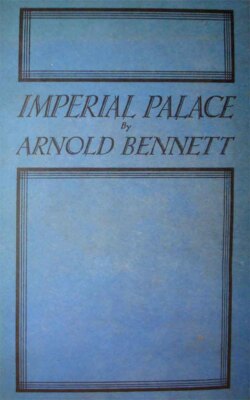Читать книгу Imperial Palace - Arnold Bennett - Страница 44
На сайте Литреса книга снята с продажи.
ОглавлениеII
As a child Dennis Dover had lived under the roof of the Palace in its most majestic days. The elder Dover had amassed incalculable money under that roof. But he had made a common mistake. He had forgotten that the earth revolves. He had assumed that luxury could go no farther than his luxury had gone. When he died, rich, though not as rich as in the grandest days, the Imperial Palace, with all its unique prestige, was beginning to be a back number. Trustees under the will of the founder had done no better than trustees usually do. Then Dennis Dover had taken command, and the public had been invited to buy the Imperial Palace. The public, ingenuous as ever, and blinded by the glitter of prestige, had bought. The Palace recovered a little, lost ground a little, recovered a little, paid a dividend, passed its dividend, and was on the very edge of being transmogrified into a block of superlative flats, when Dennis Dover had chanced to sojourn at the Wey Hotel and to find Evelyn, then in his thirties.
In ten years Evelyn, starting as an invalided A.S.C. officer towards the end of the war, and spending three-quarters of a million borrowed in instalments with much difficulty on debentures, had, after the formation of a new company, made the Palace for the second time in its career the wonder of the wide world. Twice in its career the prestige of the Palace had thus shot up like a rocket; but Evelyn had no intention that it should ever fall like a rocket.
Such, perhaps too briefly stated, was the history of the Imperial Palace Hotel, whose royal suites, owing to a dearth of royalty, were now occupied by cinema-kings, presidents of republics, and similar highnesses.
As the six passed in irregular formation through corridors and downstairs towards the larger banqueting-room (called the Imperial—the smaller banqueting-room was called the Royal) Dennis Dover stepped between Dacker and Smiss, and putting a hand paternally on the nearest shoulder of each of them, and looking down from his superior height at their upturned young faces, squeakily murmured:
“You don’t mind me referring to the colour of your livers, boys? Sign of affection.”
They smiled. They knew their own worth; and they hoped that the Chairman knew it and knew also that their interest in the Palace was fanatical, and that they were intensely proud of having been elevated to the Board at a cost to themselves of only a hundred qualifying shares each. What they did not know was that father Dennis Dover loved them the more for their apprehensiveness concerning the Resolution.
The Chairman himself was apprehensive, but he was old enough to be a fatalist; and the risks attending a resolution to be proposed at a meeting of a limited liability company could arouse no emotion in one who would soon be crossing the supreme frontier. Old Lingmell was equally unmoved, but not for the same reasons as father Dennis. He never spent time in thinking about the supreme frontier. His investments were secure, and the earth and the fruits thereof were good enough for him. Mr. Levinsohn felt no emotion either; for him the matter was strictly professional, one among a hundred such matters. As for Evelyn, he felt a certain anxiety; but he was built on a rock, the rock of his creative, organising brain, which the foolishness of no shareholders could damage, which was more valuable than any investments, and which had a world-market waiting to compete for it.
